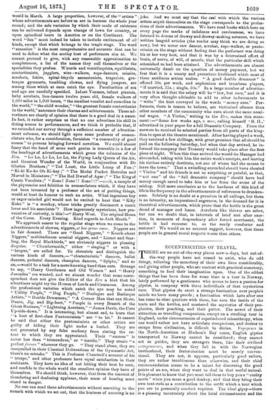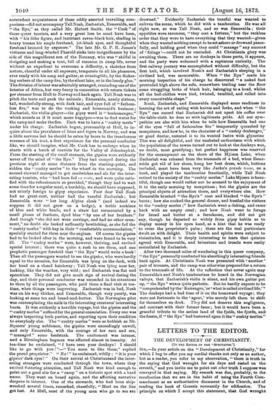ECCENTRICITIES OF TILWEL.
THERE are no out-of-the-way places now-a-days, but out-of- the-way people have not ceased to exist, who do odd things, relieving the monotony of their own lives considerably, and giving other people, who are content with practical monotony, something to feed their imagination upon. One of the oddest things that has been done for some time is a tour in Norway, lately performed by a gentleman who seems to have a passion for gipsies, in company with three individuals of that mysterious race. That gipsies do exert a strange fascination over people's minds we have many proofs ; a fascination which lasts after one has come to close quarters with them, has seen the inside of the tents and the kettles, and mastered the mysteries of their pro- phecies, their poaching, and their patter. The secret of their attraction as travelling companions, except on a strolling tour in England, under circumstances of superinduced misanthropy, when one would rather not have articulate companions, and desires to escape from civilisation, is difficult to divine. Voyageurs in the North-American or Hudson's Bay sense, English gipsies transported to Norway cannot be considered ; they cannot act as guides, they are strangers there, like their civilised entrepreneurs, and when they fall in with the Norwegian brotherhood, their fraternisation must be merely conven- tional. They are not, it appears, particularly good sailors, they are rather troublesome than otherwise, and their chief recommendation seems to be a talent for discerning the good points of an ass, when they want to deal in that useful animal. It is pleasant to know that you must tell them to buy you a" cwihty merle" when you mean a good donkey, and that they bring their own tent-rods as a contribution to the outfit which a tour which you are to personally conduct requires. The ideal gipsy—there is a pleasing uncertainty about the local circumstances and the antecedent acquaintance of these oddly assorted travelling com- panions—did not accompany Tall Noah, Zechariah, Esmeralda, and "the Rye," as they called Mr. Hubert Smith, the " Cook " of these queer tourists, and a very great loss he must have been, with "his lithe figure, and luxuriant raven-black hair, shading in heavy tresses his ample forehead, jet-black eyes, and thoughtful forehead bronzed by exposure." The late Mr. G. P. R. James's virtuous and long-winded Pharold sinks into insignificance by the side of this magnificent son of the Romany, who was "skilful in designing and making a tent, full of resource in camp life, never without an expedient to overcome a difficulty, a sketcher from nature, cheerful under all exposure, temperate in all his pleasures, ever ready with his song and guitar, at eveningtide, by the flicker- ing embers of the campfire, by the silent lake, or in the lonely glen." The division of labour was admirably arranged, reminding one of the interior of Africa, but very funny in connection with return tickets per steamer from Hull to Norway and back again. Tall Noah was to pitch the tents and pack the animals ; Esmeralda, nearly sixteen, tall, wonderfully strong, with dark hair, and eyes full of "fathom less fire," was to do the cooking and housemaid's business ; Zechariah, the violin-player—the gipsy word is " boshomengro," which sounds as if it must mean bagpipes—was to find water for the camp and make the fire. Each was to have a "cushty merle" under his charge. Zechariah began, presumably at Hull, to in- quire about the prevalence of lions and tigers in Norway, and was a little nervous lest he should be eaten by bears in the treacherous reeving of his tent, a first experience for the personal conductor like, we should imagine, what Mr. Cook has to undergo when he starts with a batch of tourists for the Valley of Jehoshaphat. From the starting of the small steamer, the gipsies were evidently never off the mind of "the Rye." They had camped during the previous night at some distance from the starting-point, and ridden the "cushty merles " to the wharf in the morning. The second steward managed to get sandwiches and ale for the inter- esting tourists, who "had been fed en route, and were quite satis- fied with the refreshments so provided," though they had to wait some time for a regular meal, a hardship, we should have supposed, not utterly foreign to gipsy experience. Poor dear Tall Noah had no great-coat, neither had the tuneful Zechariah; but Esmeralda wore "her long Alpine cloak " (and indeed we suppose it did not grow on a hedge), a treble necklace of blue and white beads, and a straw hat surmounted by a small plume of feathers, dyed blue "by one of her brothers." And though "she did not wear earrings, and had no other orna- ment," no doubt she looked sufficently bewitching, as she fed the 4' cushty merles" with hay in their "comfortable accommodation," specially erected for them near the engines. Of course the gipsies had to be looked after in the morning, and were found to be very ill. 'The "cushty merles" were, however, thriving, and excited special interest ; there was quite a rush to see them, and one prophetic passenger foretold that "the Rye" would write a book ! Then all the passengers wanted to see the gipsies, who were hardly equal to the occasion, for Esmeralda was lying on the deck, with her head on a closed hatchway ; Tall Noah was lying near her, looking, like the weather, very wild ; and Zechariah was flat and speechless. They did not give much sign of revival during the day, and their personal conductor was seconded in his attentions to them by all the passengers, who paid them a final visit at tea- time, when things were improving. Zechariah was in bed, Noah was on his way thither, and Esmeralda, though very poorly, was looking at some tea and bread-and-butter. The Norwegian pilot was contemplating the nails in the interesting creatures' interesting boots. It was evidently a horrible voyage, but the gipsies and the "cushty merles" sufficed for the general consolation. Every one was always inspecting both parties, and reporting upon their condition to everybody else. The "cushty merles" were as bobbish as Mr. Squeers' young noblemen, the gipsies were exceedingly unwell, and only Esmeralda, with the courage of her race and sex, " managed " some beefsteak. The excitement was intense, and a Birmingham bagman was affected almost to insanity. At tea-time he exclaimed, "I have seen your donkeys I should like to go with you !"—" You seem to like them," replied the proud proprietor." " No 1" he exclaimed, wildly ; "it is your gipsies' dark eyes !" On their arrival at Christiansand the inter- esting strangers were conducted through the town, where they excited flattering attention, and Tall Noah was kind enough to point out a good site for a " camp " on a historic spot with a hard name. They went on board again, and the affecting narrative deepens in interest. One of the stewards, who had been ship- wrecked several times, remarked, cheerfully, "Most on the line get lost. At Hull, most of the young men who go to sea are
drowned." Evidently Zacbariah the tuneful was wanted to enliven the scene, which he did with a tambourine. He was all right now, so was Tall Noah, and so was Esmeralda; their appetites were ravenous, "they coat a fortune," but the reckless order that they were to have everything that they wanted—gives when they wanted nothing except to be set ashore or drowned peace- fully, and holding good when they could " manage " any amount of fixings '—could not be rescinded. At Christiania glory was awaiting them. There are no donkeys in those parts, it appears,.
and the party were welcomed with a rapturous curiosity. The. first railway journey was accomplished without difficulty, but the first halt, which involved Noah's and Zachariah's sleeping in a civilised bed, was memorable. When "the Rye" made his morning inspection of his charge he discovered "a naked foot protruded high above the sofa, somewhere trailing near the floor some straggling locks of black hair, belonging to a head, whilst all the bed-clothes were tied, twisted, tumbled, and rolled into every conceivable shape."
Noah, Zechariah, and Esmeralda displayed some readiness is learning the art of eating with knives and forks, and when " the- Rye " can record that Zechariah did not upset his coffee over-
the table-cloth he does so with legitimate pride. All our sym- pathies are also with him when he tells how Esmeralda had one the eyes "full of fathomless fire" temporarily quenched by. mosquitoes, and how he, in the character of a "cushty drabengro,''
or good doctor, restored it to its wonted lustre with glycerine This was all delightful, and the unabated enthusiasm with whicS the population of the towns turned out to look at the donkeys was,.
no doubt, most gratifying ; but perfect happiness was reserved.
for the encampment on the shore of the Mjosen Lake, when- Zechariah was released from the trammels of a bed, when Esme-
ralda got rid of her shoes, hung her beat dress, which, buttons, included, must have been very like Jacko's grande tenue, on a. bush, and played the tambourine frantically, while Tall Noah, retired to the society of the "cushty merles." Lake Mjdsen is beau- tiful, though one would rather not be aroused to the enjoyment of it in the early morning by mosquitoes ; but the gipsies are the- principal objects of attraction there, and everywhere else. How- Esmeralda brushed "the Rye's" coat and blacked "the Rye's boots ; how she cooked the general dinner, and hustled the visitors- to the "cushty merles ;" how Zechariah went a-fishing, and come-
back with an empty creel ; and how Noah went to forage- for bread and butter at a farmhouse, and did not get any, though he departed so widely from gipsy habits as to- display money in his open hand, as a hint that he was ready to cross the proprietor's palm ; these are the real particulars- dwelt on with delight. Their health and spirits were subject to- vicissitudes, and it is deeply interesting to learn that quinine- agreed with Esmeralda, and brimstone and treacle were easily assimilated by Zechariah.
_ After two thousand miles of wandering in this queer company, "the Rye" personally conducted his absorbingly interesting friends
back again. At Christiania Noah was presented with 'another '-
pair of trousers, and the camp was otherwise prepared for a returns to the trammels of life. At the reflection that never again may Esmeralda's and Noah's tambourines be heard in the Norwegian.
valleys, that Zachariah's violin is silent, and his own guitar put up, "the Rye" waxes quite pathetic. But he hardly expects to be- "comprehended by the Kairengro,' or 'what is called civilised life.' "
The donkeys had a bad time of it on the homeward voyage ; they- were not fortunate in the agent,' who merely left them to shift, for themselves on deck. They did not deserve this negligence, sad contrast with their former fame ; but it would have been a graceful tribute to the ageless land of the fjelds, the fjords, and' the fosses, if "the Rye" had Widowed upon it the" el/silty merles.'































 Previous page
Previous page